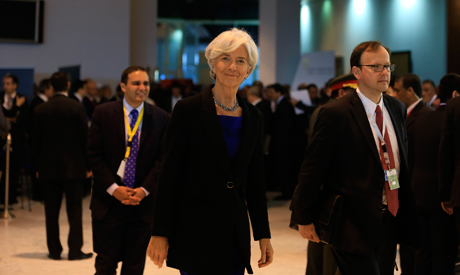
Christine Lagarde, Managing Director of the International Monetary Fund arrives at an economic conference seeking billions of dollars in investment that brings together hundreds of business executives and foreign leaders, in Sharm el-Sheikh, Egypt, Friday, March 13, 2015 (AP)
A delegation from the International Monetary Fund (IMF) concluded its visit to Egypt on Thursday, recommending the country adopt flexible a exchange rate, implement the value-added tax and further cut energy subsidies.
The IMF also approved of measures taken by the government to reduce the deficit and by the Central Bank of Egypt to curb the currency parallel market, according to a press release issued on Thursday.
Egypt's Central Bank has devalued the pound to reach LE7.73 to the dollar while widening the range through which banks are allowed to trade to LE0.1 for banks and LE0.15 for currency exchange bureaus.
A currency black market flourished in Egypt following the 2011 uprising as capital outflows and the faded tourist interest in the country cut vital sources of foreign currency, adding pressure to the Egyptian pound.
"We consider that a gradual move toward a more flexible exchange rate policy focused on achieving a market-clearing rate would serve Egypt’s interests," read the statement.
The IMF also recommended that the government take further steps in the fiscal reform and structural reform programme.
"Lower fuel and electricity subsidies, combined with the implementation of the VAT, would go a long way toward improving the strength of the budget," read the statement.
Hany Kadry Dimian, Egypt's finance minister, announced last month that the government would implement the value-added tax soon, which would be a flat tax rate on consumption distributed among the different production stages.
The fund has been in talks with the Egyptian government over recent years to negotiate a loan conditional upon the implementation of a structural adjustment programme, but rising political tension following the 2011 uprising combined with a weakened economy have stalled the talks.
However, as the political environment stabilised compared to the years following the uprising, the government was able to return to the fiscal reforms programme, taking politically sensitive measures such as raising fuel and electricity prices.
Talks on a new loan remain officially paused with the government seeking foreign currency through dollar bonds in the international markets,with the latest issued in June at a value of $1.5 billion with maturity of 10 years and at an interest rate of 6 percent.
Egypt's growth reached 4.2 percent in the fiscal year 2014/15 and the inflation rate has slowed to 7.88 percent in August after a hike in fuel prices in July 2014 pushed it to exceed 11 percent.
Egypt targets a growth rate of 5 percent by the end of the current fiscal year.
Short link: